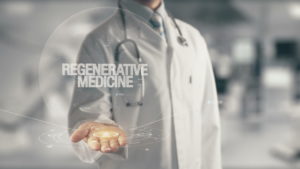11 Feb Future Implications of Stem Cells
While stem cells have been a hot topic of conversation over the last few years, there is still much to be investigated before we have a full understanding of their implications. We know that stem cells have the ability to differentiate into various kinds of cells in the body. We also know this means they may be able to treat conditions we once thought untreatable. However, every day that passes, it seems more and more research is being conducted on stem cells, and thus, we find more potential implications for stem cell use in the future.
One of the biggest implications of stem cells in the future of medicine is the ability to regenerate damaged tissue. We know that injecting stem cells into damaged tissue can stimulate the body’s natural healing process. However, more research still needs to be done to fine-tune the current stem cell therapy procedures. Using stem cells means there would be no need for skin grafting or a chance of organ rejection. This has further implications with the possibility of regrowing limbs of people who have experienced horrible accidents or who were born with defects.

The ability of stem cells to differentiate into cells needed by the brain and spinal cord could make a world of difference for those suffering from paralysis or degenerative neurological diseases. For example, patients suffering from genetic and chronic diseases such as amyotrophic lateral sclerosis, Alzheimer’s, and Huntington’s disease could find that stem cells have the ability to pause or even reverse the damage done by the diseases. In addition, as more research is being done on stem cell therapy, there is hope technology will advance to the point that this form of therapy is covered by medical insurance, and available to all people.
Another important implication of stem cells in the future is the ability to treat cancer. While there are certain treatments that currently exist for those who have cancer, such as chemotherapy and radiation, these can make the patient very ill. It can be extremely difficult for physicians to find the right balance of treatments that are strong enough to eliminate cancer, but that does not kill too many of the patient’s healthy cells. Stem cell therapy may eventually be honed in on enough to create custom treatments for cancer patients, which replace diseased cells with stem cells, thus eliminating the need for such harsh treatments.
We have only touched the tip of the iceberg when it comes to understanding stem cells and potential medical applications. We have a decent understanding of how they work, but we have yet to fine-tune how stem cells may be able to aid those suffering from a plethora of ailments. There is a lot more research needed to understand the implications of stem cells in the field of orthopedics, cardiology, oncology, neurology, and so many other fields of medicine. As stem cells become more researched, and technology advances, there is hope that one-day stem cell therapy will be an affordable and effective treatment for those suffering from various conditions.


No Comments